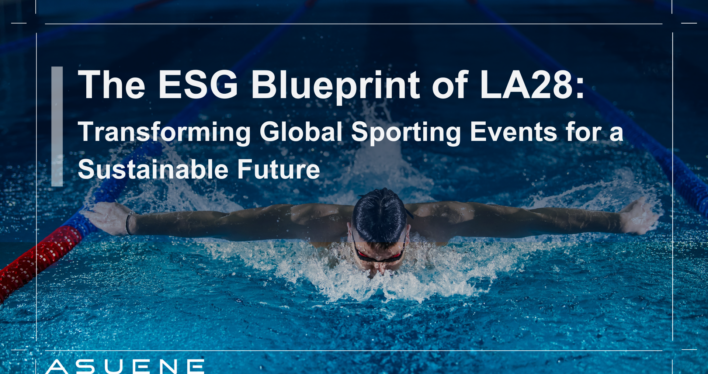- Article Summary
-
Introduction
The Los Angeles 2028 Olympic and Paralympic Games (LA28) will not only be a celebration of athletic excellence but also a landmark in embedding environmental, social, and governance (ESG) principles into the world’s most-watched sporting event. Guided by its Impact & Sustainability Plan, LA28 is positioning itself as a model for future mega-events by weaving sustainability and inclusivity into every operational layer. This article explores the ESG insights of LA28, with a particular emphasis on its environmental strategies, while also analyzing its social commitments and governance framework.
Economic Empowerment
A cornerstone of LA28’s ESG approach is driving shared prosperity across the region. The committee has committed that 75% of its addressable spend will go to businesses within Greater Los Angeles, with 25% directed to small businesses. This not only supports local suppliers but also creates a ripple effect across industries tied to tourism, live entertainment, and infrastructure development. Programs such as Business Pathways and Community Business Supplier Program provide education, procurement opportunities, and matchmaking with global value chains.
Key Targets:
- 75% of addressable spend within Greater Los Angeles
- 25% of addressable spend with small businesses
- Thousands of new local jobs expected
- Workforce training partnerships with CSU campuses and 19 community colleges
On the workforce front, LA28 collaborates with California State University campuses and the Los Angeles Regional Consortium of 19 community colleges to create skill-building pathways. Initiatives like the Career Accelerator Program and the Athlete Fellowship Project prepare both local talent and former Olympians/Paralympians for careers in sports management and mega-event delivery. These initiatives are expected to generate thousands of jobs, leaving behind an economic legacy long after the Games conclude.
Youth and Social Impact
LA28’s social impact strategy is built around expanding access to sport for young people, regardless of their background. The flagship program PlayLA represents a $160 million investment, which is the largest private investment in youth sports in California’s history. The initiative aims to reach two million enrollments and ensure that 100% of the city’s recreation and aquatic centers offer low or no-cost youth sports by 2028. In 2025, PlayLA celebrated surpassing one million total program enrollments.
Key Milestones:
- $160 million investment in youth sports
- Two million enrollments targeted by 2028
- One million enrollments achieved by 2025
- 50% of participants to be girls by 2028
- Adaptive sports integrated across programs
Equity and inclusion are central pillars of this effort. Adaptive sports such as wheelchair basketball, para swimming, and blind soccer clinics are integrated into PlayLA, ensuring accessibility for children with disabilities. Beyond participation, programs like the Nike Coach Summit focus on training coaches to foster safe, inclusive, and supportive environments for young athletes.

Environmental Stewardship
The environmental dimension is where LA28 sets bold new standards. Most notably, LA28 will be the first Olympic and Paralympic Games since 1948 to build no new permanent venues. Instead, existing world-class facilities will be repurposed, with UCLA hosting the Athletes’ Village. This radical reuse approach reduces construction-related emissions and costs, while temporary infrastructure will follow strict circular economy principles, with 90% of materials reused or recycled after the Games.
Environmental Commitments:
- 100% renewable electricity for all venues
- 90% of temporary infrastructure materials reused or recycled
- Transit-first Games with zero or near-zero emission shuttle buses
- No new permanent sports venues constructed
LA28 vs. Paris 2024 Environmental Goals
| Category | Paris 2024 | LA28 2028 |
|---|---|---|
| New Permanent Venues | Some | None |
| Renewable Energy Share | ~95% | 100% |
| Material Reuse/Recycling | ~80% | 90% |
| Zero-Emission Transport | Expanding | 100% buses targeted |
Waste reduction is equally ambitious: concessions will use only reusable, recyclable, or compostable beverage containers, food waste will be composted, and surplus food donated. The Resilient by Nature initiative ties these efforts together, investing in wildfire resilience, ocean protection, and cooling solutions for vulnerable neighborhoods.
Governance and Accountability
Strong governance underpins LA28’s ESG commitments. The organizing committee is implementing a sustainability management system aligned with ISO 20121, the global standard for sustainable event management. Suppliers are bound by the Responsible Sourcing Code, which screens all RFP participants for environmental, social, and ethical compliance. Human rights considerations are embedded through a dedicated Human Rights Strategy aligned with the UN Guiding Principles, while anti-corruption measures are reinforced through annual staff training and monitoring.
Governance Frameworks:
| Framework | Purpose |
| ISO 20121 | Sustainable event management certification |
| Responsible Sourcing Code | Screening of all suppliers for ESG compliance |
| Human Rights Strategy | Alignment with UN Guiding Principles on Business & Human Rights |
Accessibility and inclusivity extend beyond sports programming into Games operations, with a Host City Accessibility Awareness and Enhancement Program aimed at making Los Angeles more barrier-free for residents and visitors alike. These governance mechanisms ensure that ESG commitments translate into enforceable standards, rather than aspirational statements.
Conclusion
The ESG blueprint of LA28 demonstrates how a mega-event can be more than a fleeting spectacle. By prioritizing radical reuse of infrastructure, renewable energy, inclusive youth programming, and transparent governance, LA28 offers a transformative model for integrating sustainability into global sports. Its legacy will be measured not only in medals but also in economic opportunities, healthier communities, and a resilient environment. For future host cities and large-scale events worldwide, LA28 stands as a powerful case study in redefining what sustainability in sports can achieve.
Why Work with ASUENE Inc.?
Asuene is a key player in carbon accounting, offering a comprehensive platform that measures, reduces, and reports emissions. Asuene serves over 10,000 clients worldwide, providing an all-in-one solution that integrates GHG accounting, ESG supply chain management, a Carbon Credit exchange platform, and third-party verification.
ASUENE supports companies in achieving net-zero goals through advanced technology, consulting services, and an extensive network.


